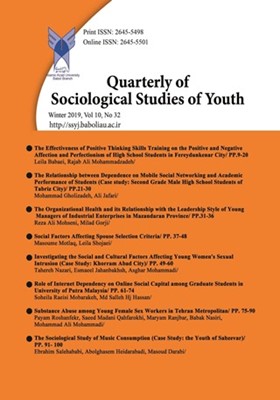The Effectiveness of Positive Thinking Skills Training on the Positive and Negative Affection and Perfectionism of High School Students in Fereydunkenar City
محورهای موضوعی :Leila Babaei 1 , Rajab Ali Mohammadzadeh 2
1 - MA Candidate, Department of Psychology, Ayatollah Amoli Branch, Islamic Azad University, Amol, Iran
2 - Assistant Professor, Department of Psychology Group, Payam Noor University, Tehran, Iran
کلید واژه: perfectionism, positive thinking, Skills training, Negative affection, Positive affection,
چکیده مقاله :
The main purpose of this study was to evaluate the effectiveness of teaching positive thinking skills on students' negative emotions and perfectionism. The present study was experimental. The statistical population of this study was all high school female students in the city of Fereydunkenar in the academic year of 2017-2018. The research sample consisted of 30 high-perfectional students who were randomly selected. These 30 subjects were divided into two experimental and control groups, which were considered for 13 sessions of 90 minutes for teaching positive thinking skills. Two questionnaires were used for data collection. The obtained data were used using covariance analysis. The results showed that teaching positive thinking skills was effective in reducing the negative emotion and perfectionism among female students (P <0.01). As a result, this approach can be used as a method in schools to improve the mental status of students.
Carr, A. (2007). Positive psychology. Tehran: Roshd Publication.
Donaldson, S.I., Dollwet, M., & Rao ,M.A. (2014). Happiness, excellence, and optimal human functioning: Examining the peer-reviewed literature linked to positive psychology. Journal of Positive Psychology, 10(3), 95-185.
DuBrin, A. J. (2004). Applying psychology: Individual and organizational effectiveness. Prentice Hall.
Effert, B.R., (1989). Decisional procrastination: Examining personality correlates. Journal of Sociology Behavior, 4(1), 15-25.
Fee, R.L., Tangney, J.P. (2012). Procrastination: A means of avoiding shame or guilt?. Journal of Social Behavior, 15(5), 167-175.
Ferrari, J.R. (1994). Dysfunctional procrastination and its relationship with self-esteem, interpersonal dependency, and self-defeating behaviors. Individual Differences, 17(5), 673–685.
Glick, D.M., Millstein, D.J, & Orsillo, S.M. (2014). A preliminary investigation of the role of psychological inflexibility in academic procrastination. Journal of Context Behavior, 3(2),81–90.
Grunschel, C., Patrzek, J., (2013). Exploring different types of academic delayers: A latent profile analysis. Individual Differences, 23, 225–233.
Kagan, M., Cakır, O., Ilhan, T., & Kandemir, M. (2012). The explanation of the academic procrastination behavior of university students with perfectionism, obsessive – compulsive and five factor personality traits. Sociological Behavior, 2(1), 211-220.
Kandemir, M.(2014). Reasons of academic procrastination: Self-regulation, academic self-efficacy, life satisfaction and demographics variables. Sociological Behavior, 1(15), 188–193.
Lay, C., Silverman, S. (1996). Trait procrastination, anxiety, and dilatory behavior. Individual Differences, 21(1), 61–67.
Lay, C.H., & Schouwenburg, H.C. (1993). Trait procrastination, time management, and academic behavior. Journal of Social Behavior, 8(4), 647-652.
Neenan, M. (2008). Tackling procrastination: An REBT perspective for coaches. Journal of Emotional Behavior, 26(1), 53–62.
Rashid, T. (2007). A positive psychotherapy for young adults and children. Journal of Positive Psychology, 37, 325–331.
Seligman, M.E., Ernst, R.M., Gillham, J., Reivich, K., & Linkins, M. (2009). Positive education: positive psychology and classroom interventions. Oxford Education, 35(3), 293–311.
Seligman, M.P, Rashid, T., Parks,A.C. (2006). Positive psychotherapy. Psychological Journal, 61(8), 774–788.
Seligman, M.P, Steen, T.A, Park, N., & Peterson, C. (2005). Positive psychology progress: Empirical Validation of Interventions. Psychological Journal, 60(5), 410–421.
Seligman, M.P. (2005). Optimistic children. Tehran: Roshd Publication.
Steel, P. (2007). The nature of procrastination: a meta-analytic and theoretical review of quintessential self-regulatory failure. Psychological Bulletin, 133(1):65–94.
Vakili, M. (2009). The effectiveness of group therapy on Adjustment of male high school students in Karaj city. Tehran: Allame Tabatabaei University.
Wong, S. S. (2012). Negative thinking versus positive thinking in a Singaporean student sample: Relationships with psychological well-being and psychological maladjustment, Learning Individual Difference, 22(1), 76–82.


